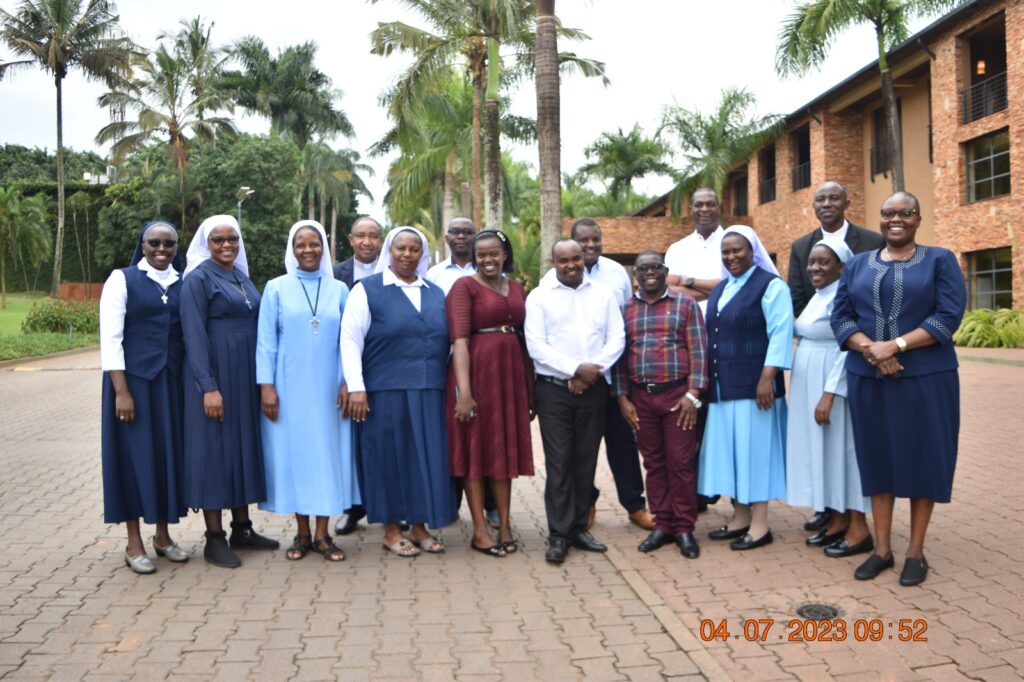AMECEA: Survey Findings on Vulnerable Children Convincing on Need for Care Reform Agenda

Sr. Jecinter Antoinette Okoth, FSSA
The findings from a survey conducted recently for vulnerable children separated from their families and are cared for in Catholic institutions, should act as a tool to help win peoples hearts and buy the idea of family and community-based approaches in caring for children, a cleric has said.
At a meeting held in Kampala, Uganda that brought together project managers for the Catholic Care for Children (CCC), case managers and participants from the Association of Member Episcopal Conferences in Eastern Africa (AMECEA) Secretariat who are CCC partners, Fr. Andrew Kaufa gave an analysis from the study finding published in the month of May in a document titled “A Regional Portrait of Catholic Care for Children in Eastern Africa.”
According to Fr. Kaufa who is the Coordinator of AMECEA Social Communications Department, the CCCs survey data is significant so it can be taken as “a tool and the Gospel truth for our agenda of winning the hearts and minds of stakeholders in the mission,” and at the same time, “to identify and translate the gaps within our countries and institutions into actionable points from our local perspective.”
Additionally, the regional portrait that describes the growing efforts by Religious men and women in ensuring that children can grow up in safe, nurturing families or family-like environment rather than institutions, “Provides a solid foundation for decision making, problem solving, performance valuation of the CCCs, client insights about CCC, predictive analysis and evidence-based innovativeness in the process of winning the hearts and minds of stakeholders,” Fr. Kaufa said.
In his analysis concerning the regional portrait findings, the member of the Religious congregation of Missionaries of the Company of Mary also known as the Montfort Missionaries noted that the portrait shows that the Care reform movement has achieved a lot and is moving in the right direct, though more can be achieved.
The survey was carried out in four countries within the AMECEA region who are members of CCC that is Uganda, Kenya, Zambia and Malawi.
Consequently, Fr. Kaufa narrated, the data from the portrait is helpful for “Raising awareness about the nature of and need for care reform, for use as evidence to influence and advocate for care reform within the stakeholders’ respective constituencies and beyond and at the same time they can be used for planning and implementation of efforts to reform care using the evidence which has documented the needs, gaps, opportunities, and effective strategies.”
He added in his analysis that the portrait highlights best practices within the four CCCs and demonstrates to stakeholders that care reform is possible, It increases visibility of sisters’ role in care and care reform, encourages fuller participation in care reform within the wider Catholic community including hierarchy, clergy, dioceses, parishes, small Christian communities and Catholic organizations and at the same time it helps build an evidence base pertaining to Catholic care reform mobilizes human and financial resources toward care reform.
Prior to conducting the survey in the Eastern Africa region, members of CCC met in Lilongwe, Malawi where they shared about the baseline surveys conducted in the four countries to understand more about the policies in catholic Care for Children Institutions (CCCIs), the social workers qualification gaps and the missing tools in the CCCs mission and develop way forward for the regional portrait project.
In his sharing recounting the March meeting held at St. Theresa Carmelite Sisters in Lilongwe, Mr. Bernard Mberere highlighted the challenges that hinder close collaboration between safeguarding offices, Small Christian Communities (SCCs), Family life desks and CCC movement.
“The CCC have not been entrenched into the Church program and structures and at the same time, safeguarding in the Church is an emerging issue so there is need to build more in the process of collaboration,” he noted.
He narrated further addressing about 16 participants that there is need for church leadership to buy in to the CCC idea and create mind shift towards holistic care of children and also Bridging the gap between safeguarding and the CCC towards synergy.”
According to Mr. Mberere the AMECEA’s Information and Communication Technologies (ICT) officer the CCCs, bishops conference, safeguarding offices and family life structures need to have “consistent joint engagement with other stakeholders in the church, bring the clergy on board at the CCIs level to appreciate the works of the CCC movements and engage the safeguarding officers at the national level to create synergy so as to increase collaborate.”
Generally, family care for children is the foundation for healthy development of a child and it promotes a positive sense of identity, security and belonging as well as supporting community participation and integration.


